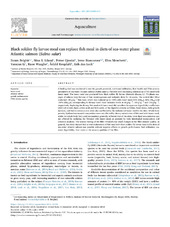| dc.contributor.author | Belghit, Ikram | |
| dc.contributor.author | Liland, Nina Sylvia | |
| dc.contributor.author | Gjesdal, Petter | |
| dc.contributor.author | Biancarosa, Irene | |
| dc.contributor.author | Menchetti, Elisa | |
| dc.contributor.author | Li, Yanxian | |
| dc.contributor.author | Waagbø, Rune | |
| dc.contributor.author | Krogdahl, Åshild | |
| dc.contributor.author | Lock, Erik-Jan | |
| dc.date.accessioned | 2019-09-04T13:24:39Z | |
| dc.date.available | 2019-09-04T13:24:39Z | |
| dc.date.issued | 2018-12-12 | |
| dc.Published | Belghit I, Liland NS, Gjesdal, Biancarosa I, Menchetti, Li Y, Waagbø R, Krogdahl Å, Lock E. Black soldier fly larvae meal can replace fish meal in diets of sea-water phase Atlantic salmon (Salmo salar). Aquaculture. 2019;503:609-619 | eng |
| dc.identifier.issn | 1873-5622 | en_US |
| dc.identifier.issn | 0044-8486 | en_US |
| dc.identifier.uri | http://hdl.handle.net/1956/20802 | |
| dc.description.abstract | A feeding trial was conducted to test the growth potential, nutritional utilization, liver health and fillet sensory parameters of sea-water Atlantic salmon (Salmo salar L.) fed diets with increasing substitution of fish meal with insect meal. The insect meal was produced from black soldier fly larvae (Hermetia illucens, L.). Triplicate sea-cages of salmon were fed one of four isonitrogenous and isolipidic diets for 16 weeks. The control diet (IM0) contained 100 g kg−1 fish meal, which was replaced up to 100% with insect meal (33% (IM33), 66% (IM66) and 100% (IM100)), corresponding to dietary insect meal inclusion levels at 50 g kg−1, 100 g kg−1 and 150 g kg−1, respectively. Replacing the dietary fish meal with insect meal did not affect the apparent digestibility coefficients (ADC) of protein, lipid, amino acids and fatty acids, or the digestive enzyme activities. Feed intake, daily growth increase, and feed conversion ratio were also unaffected by the inclusion of insect meal in the diets. Whole body protein, lipid and amino acid composition were not affected by dietary substitution of fish meal with insect meal, while the whole body fatty acid composition generally reflected that of the diets. Liver lipid accumulation was not affected by replacing the fishmeal with insect meal, as assessed by both histological examinations and chemical analyses. The sensory testing of the fillet revealed only small changes in the fillet sensory quality. In general, this study showed that a total replacement of fish meal with black soldier fly larvae meal in the diets of sea-water Atlantic salmon was possible without negative effects on growth performance, feed utilization, nutrient digestibility, liver traits or the sensory qualities of the fillet. | en_US |
| dc.language.iso | eng | eng |
| dc.publisher | Elsevier | en_US |
| dc.rights | CC BY-NC-ND 4.0 | eng |
| dc.rights.uri | https://creativecommons.org/licenses/by-nc-nd/4.0/ | eng |
| dc.subject | Insect meal | eng |
| dc.subject | Fillet sensory quality | eng |
| dc.subject | Atlantic salmon | eng |
| dc.subject | growth performances | eng |
| dc.title | Black soldier fly larvae meal can replace fish meal in diets of sea-water phase Atlantic salmon (Salmo salar) | en_US |
| dc.type | Peer reviewed | |
| dc.type | Journal article | |
| dc.date.updated | 2019-07-02T13:07:28Z | |
| dc.description.version | publishedVersion | en_US |
| dc.rights.holder | Copyright The Author(s) 2018 | en_US |
| dc.identifier.doi | https://doi.org/10.1016/j.aquaculture.2018.12.032 | |
| dc.identifier.cristin | 1696436 | |
| dc.source.journal | Aquaculture | |
| dc.identifier.citation | Aquaculture. 2019, 503, 609-619. | |

